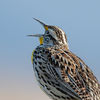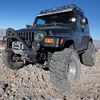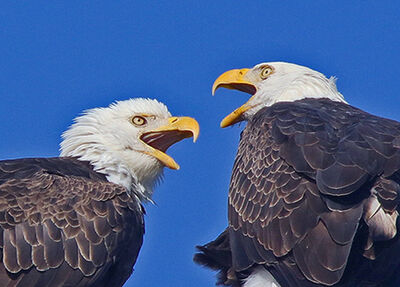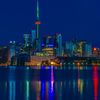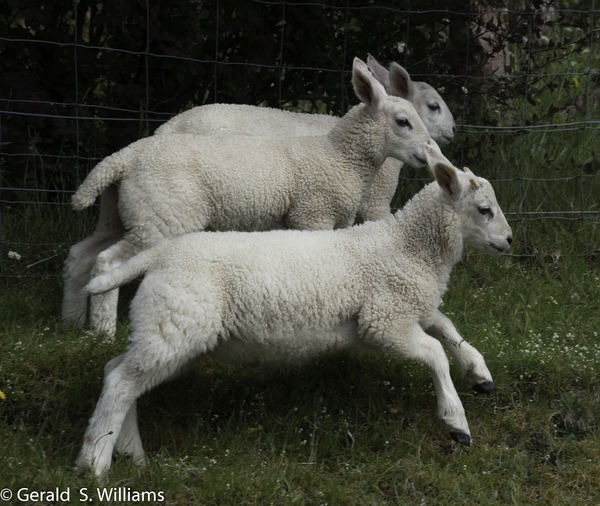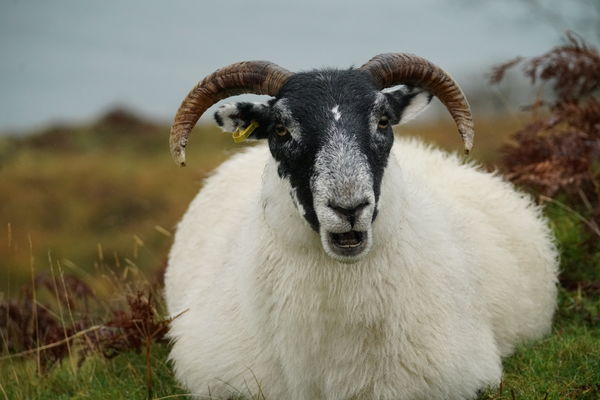Full frame versus cropped camera
Aug 28, 2018 09:48:35 #
Banjobob1023 wrote:
I just got back from Africa and shot 1700 photos with a combination of a Nikon Full Frame D750 and a Cropped Frame D500. Each camera has its unique advantages. I’ve made a photo book and printed several images on canvas to pretty large sizes. My non-professional eyes can’t tell the difference. If you like your camera, keep it and don’t worry about the hype.
Killer camera duo!!
Aug 28, 2018 10:04:29 #
mdpathjp wrote:
I would be interested in the so called desirability of full frame cameras; they are bigger, heavier and cost more as do the lens. Is it printing? My Nikon D7200 makes beautiful 16x20 prints. I just don't understand why photographers seem biased toward this format.
I use my full frame camera for the larger, more expansive shot (think landscape, mountain scenes) and my cropped camera for wildlife and smaller object-type shots. I love them both equally!
Aug 28, 2018 10:08:36 #
via the lens wrote:
I use my full frame camera for the larger, more expansive shot (think landscape, mountain scenes) and my cropped camera for wildlife and smaller object-type shots. I love them both equally!



Aug 28, 2018 10:22:53 #
mdpathjp wrote:
I would be interested in the so called desirability of full frame cameras; they are bigger, heavier and cost more as do the lens. Is it printing? My Nikon D7200 makes beautiful 16x20 prints. I just don't understand why photographers seem biased toward this format.
Full frame cameras are built with the pro in mind. Therefore they are usually a little more durable, i.e. longer shutter life, weather resistant, larger sensor for making larger prints, less digital noise, have top of the line features, but sometimes not the fluffy bells and whistles that some of the consumer cameras have. Those fluffy bells and whistles are just to sell cameras so that it seems like you are getting a lot for your money.
But honestly, a consumer camera or a prosumer camera in the hands of a creative photographer can take pictures that you wouldn't be able to tell apart from a full frame camera with a top of the line lens attached. I'm telling you the truth.
Aug 28, 2018 10:43:42 #
Aug 28, 2018 10:47:30 #
burkphoto wrote:
..... It costs more... has snob appeal for some.
That said, if you want room to crop, or if you make LARGE landscape images, or if you photograph scenes that will be printed huge and examined from a foot away, full frame gear becomes desirable.
That said, if you want room to crop, or if you make LARGE landscape images, or if you photograph scenes that will be printed huge and examined from a foot away, full frame gear becomes desirable.


..
Aug 28, 2018 11:17:59 #
It was indoor sports, concerts, weddings and other low light non-flash photography that drove me to FF, and when you are pushing the limit on both shutter speed and high ISO/low noise, that extra 1-1.5 stops is worth the weight and expense. It all depends on YOUR needs as to which format satisfies your requirements the best. I will add that the “crop factor” of crop bodies can be both a help or a hindrance depending on what you’re shooting. A help when you need the longer “reach” when shooting things like BIF, but a hindrance when you want the wide field of view of a wide angle lens without resorting to the distortion of ultrawides. Again, all depends on your particular needs.
Aug 28, 2018 11:44:03 #
mdpathjp wrote:
I would be interested in the so called desirability of full frame cameras; they are bigger, heavier and cost more as do the lens. Is it printing? My Nikon D7200 makes beautiful 16x20 prints. I just don't understand why photographers seem biased toward this format.
Many of us OF’s started imaging on film which was mostly 35mm and same size as the sensor in a FF camera body. Some of us still shoot film (I have an F5). So we’re comfortable with that size. However in addition to my digital D810 I also use an E-M1 quite often and I am very happy with it. In Africa, I shot with a D810, D7000 and my wife used a E-M5m2. Our book is 240 pages and it is impossible to tell which camera was used for which image. The key to good photography is skill in capture and PP, not sensor size.
Aug 28, 2018 12:02:58 #
oldgrayowl wrote:
Why are you being so unprofessional? Person asks a question. So what if it has been asked many times beforehand? HE/SHE hasn't asked it.
If you don't like the question, don't respond to it.
Who knows, perhaps someone new has a different perspective on the question?.
If you don't like the question, don't respond to it.
Who knows, perhaps someone new has a different perspective on the question?.
I agree, let someone new ask the same question if they want, no problem.
Aug 28, 2018 12:40:27 #
I came from a full-frame Nikon D3 to a full-frame Nikon D810 which like most cameras have their strong points however, although I don't own one, I have always admired the Nikon D500 for its autofocus speed and processing power and it is the choice of many wildlife and sports photographers and it is an APS-C sensor camera which speaks for the ability of the APS-C system.
Aug 28, 2018 12:58:12 #
I've shot full frame (24x36mm) since the mid 50s. So, when digital came out with FX, I jumped at it. I'm just accustomed to that size in a 35mm style camera. I also shoot 120 and 4x5. If someone were to provide a camera with a sensor that was either 6x6, 6x7, or 4x5, I'd probably want one of those.
That preference is augmented by the technical advantages of an FX size sensor.
--Bob
That preference is augmented by the technical advantages of an FX size sensor.
--Bob
mdpathjp wrote:
I would be interested in the so called desirability of full frame cameras; they are bigger, heavier and cost more as do the lens. Is it printing? My Nikon D7200 makes beautiful 16x20 prints. I just don't understand why photographers seem biased toward this format.
Aug 28, 2018 13:17:09 #
I have a D500 for high school sports and birds. A D750 for portraits and landscapes. A D3s for low light shooting at night and inside gyms where lighting is dim. I don’t view the D500 as inferior to these other two cameras at all. Under the right conditions, it can shoot the pants off the other two any day of the week.
Aug 28, 2018 13:19:15 #
xt2
Loc: British Columbia, Canada
There are many "good" reasons to prefer either format imo. This site seems to enjoy a majority base of subscribers that prefer the FF format. Good for them! There are many other sites that seem to lean towards the smaller format. In the end, a preferred bias may be as simple as the product that the subscriber has owned & enjoyed for many years. Mirrorless and sometimes smaller sensors are a result of technology moving forward and are newer and may not yet enjoy the following the older FF format appears to have on this website.
Cheers!
Cheers!
mdpathjp wrote:
I would be interested in the so called desirability of full frame cameras; they are bigger, heavier and cost more as do the lens. Is it printing? My Nikon D7200 makes beautiful 16x20 prints. I just don't understand why photographers seem biased toward this format.
Aug 28, 2018 13:20:45 #
xt2
Loc: British Columbia, Canada
Banjobob1023 wrote:
I just got back from Africa and shot 1700 photos with a combination of a Nikon Full Frame D750 and a Cropped Frame D500. Each camera has its unique advantages. I’ve made a photo book and printed several images on canvas to pretty large sizes. My non-professional eyes can’t tell the difference. If you like your camera, keep it and don’t worry about the hype.
Excellent advice...
Aug 28, 2018 13:46:59 #
I own both APS-C Sony A6500 and FF Sony A7RIII and A7III. The larger individual pixel size and difference in pixel density favors the FF when it comes to showing less imperfections in your shot, better higher ISO performance, less noise, and ultimate resolution. However I can use my APS-C A6500 and make photos of excellent image quality that no one would know wasn't shot on a FF unless I blew it up to a great degree and did pixel-peeping.
Burkphoto, one of the veteran shooters here on UHH loves his micro 4/3rds gear which makes great shots for him. So it is really more subjective, than any hard and fast rules, which system is best for you and your subjects and the way you shoot. You can take all the advice from all the folks here, but really you would need to shoot the same or similar subject with the different formats, under varying lighting conditions, to really know what you like best. Barring that, there are many good, and some poorer youtube comparisons showing examples from each format. I choose FF for the majority of my paid work simply to get the very ultimate image quality I can work with for my clients. But other pros do fine shooting with APS-C and Micro 4/3rds
Of course you also have think about and factor in, your budget, the size and weight of the gear ,and whether they are good quality and affordable lenses and accessories available for it.
Here are two different shots of sheep from the Highlands of Scotland. Can you tell which one was shot with my 24 megapixel APS-C A6500 and which was shot with my 42 megapixel FF A7RII ? Tough to tell isn't it. Both shots are very good image quality IMHO. CLICK ON DOWNLOAD BENEATH EACH SHOT TO SEE FULL RESOLUTION ,SHARPNESS AND COLORS. IF YOU LOOK CLOSELY, DETAIL IS EXCELLENT IN BOTH SHOTS.
The answer: the shot of the leaping lambs was shot under much more difficult conditions, in lower light , in shade, and from a moving vehicle. That is the APS-C shot.
The other adult sheep shot was in brighter, better light, a non-moving subject, from a stationary camera position and is the FF shot. Cheers
Burkphoto, one of the veteran shooters here on UHH loves his micro 4/3rds gear which makes great shots for him. So it is really more subjective, than any hard and fast rules, which system is best for you and your subjects and the way you shoot. You can take all the advice from all the folks here, but really you would need to shoot the same or similar subject with the different formats, under varying lighting conditions, to really know what you like best. Barring that, there are many good, and some poorer youtube comparisons showing examples from each format. I choose FF for the majority of my paid work simply to get the very ultimate image quality I can work with for my clients. But other pros do fine shooting with APS-C and Micro 4/3rds
Of course you also have think about and factor in, your budget, the size and weight of the gear ,and whether they are good quality and affordable lenses and accessories available for it.
Here are two different shots of sheep from the Highlands of Scotland. Can you tell which one was shot with my 24 megapixel APS-C A6500 and which was shot with my 42 megapixel FF A7RII ? Tough to tell isn't it. Both shots are very good image quality IMHO. CLICK ON DOWNLOAD BENEATH EACH SHOT TO SEE FULL RESOLUTION ,SHARPNESS AND COLORS. IF YOU LOOK CLOSELY, DETAIL IS EXCELLENT IN BOTH SHOTS.
The answer: the shot of the leaping lambs was shot under much more difficult conditions, in lower light , in shade, and from a moving vehicle. That is the APS-C shot.
The other adult sheep shot was in brighter, better light, a non-moving subject, from a stationary camera position and is the FF shot. Cheers
If you want to reply, then register here. Registration is free and your account is created instantly, so you can post right away.
